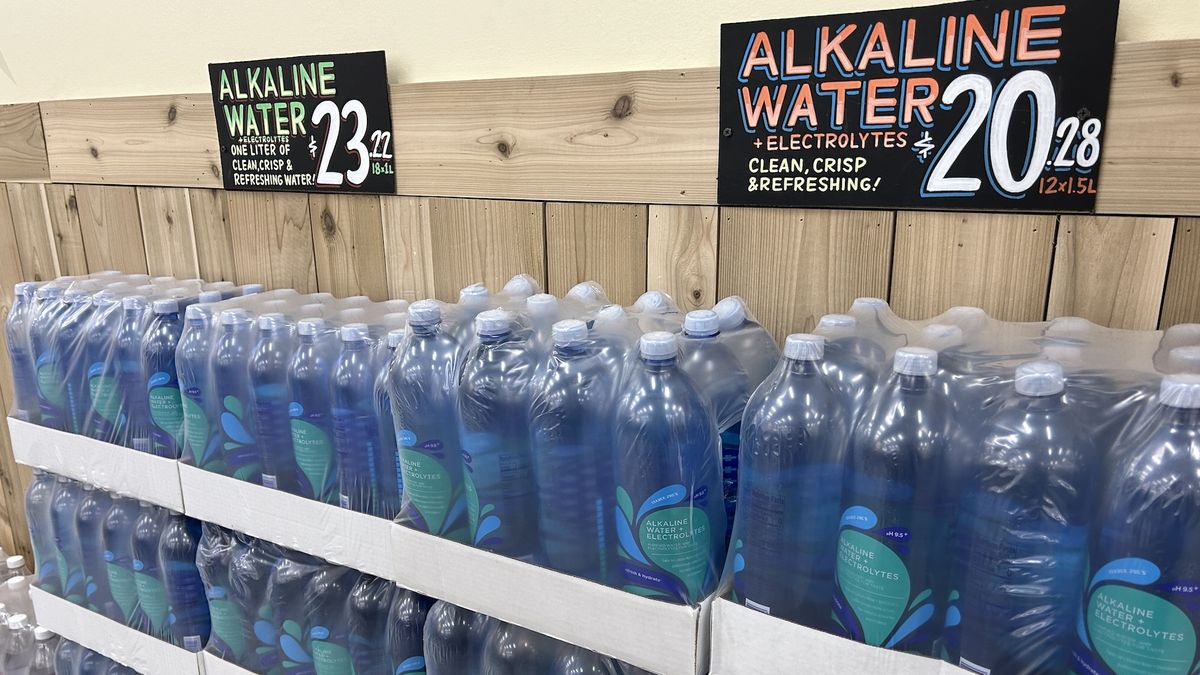What is alkaline water, and does it have any benefits?
Despite the health claims surrounding alkaline water, scientific evidence suggests its purported benefits may be overhyped.

Drinking alkaline water has become a popular trend, with many companies claiming it offers a variety of benefits, from improved hydration to chronic disease prevention.
But what is alkaline water, and does it actually have any benefits?
"The claims are not justifiable," Salome Kruger, a professor of nutrition at the Centre of Excellence for Nutrition at North-West University at Potchefstroom in South Africa, told Live Science.
Substances that are alkaline are basic, or the opposite of acidic — they have a high pH, while acids have a low pH. Lower pH levels reflect a higher quantity of positively charged particles. Alkaline water usually has a pH level between 8 and 9, higher than that of regular drinking water, which is typically "neutral" at around 7.
Water can become alkaline when it flows over rocks and picks up alkaline minerals, or it can be produced artificially through electrolysis — a process in which filtered water passes through a device that separates the water into alkaline and acidic streams. The alkaline stream contains minerals like calcium, magnesium and potassium.
Related: Why does drinking water feel so good when you're thirsty?
When consumed, it's unlikely alkaline water has any long-lived impacts on the body. That's because the moment it comes in contact with the stomach, its pH is neutralized by the acidity of the gastric juices — which has a pH of 1.5 to 3.5.
Sign up for the Live Science daily newsletter now
Get the world’s most fascinating discoveries delivered straight to your inbox.
The bicarbonate in the water reacts with gastric acid to form water and carbon dioxide, which is then burped out. The minerals in the water are absorbed in the small intestine and enter the bloodstream, where pH is tightly maintained between 7.35 and 7.45 thanks to the lungs and kidneys. Excess minerals in the blood are filtered out by the kidneys and excreted.
Thus, drinking alkaline water is unlikely to significantly "alkalize" the body. What's more, scientific studies on possible health effects of alkaline water are limited and often inconclusive, Kruger said.
Test-tube studies suggest that alkaline water can inactivate human pepsin, a digestive enzyme. In acid reflux, pepsin reaches the throat and damages tissue, so in that context, inactivating pepsin might sound beneficial. But in the stomach, this could potentially disrupt digestion, which would be undesirable, Kruger explained.
Animal research has shown potential benefits, such as increased life span and weight loss, in animals that consumed alkaline water for long periods of time. But researchers could not explain the mechanisms behind these effects, so it's unclear if they're applicable to humans.
One observational study of over 300 women found that those who regularly drank alkaline water had lower body mass indexes (BMIs), blood sugar levels and blood pressure than those who drank normal water. But the former group also had higher incomes, better nutrition and more physical activity. "These lifestyle factors are known to have a much stronger impact on chronic disease risk than simply drinking alkaline water," Kruger said.
There is also no conclusive evidence that alkaline water hydrates better than regular water. In a 2016 study, researchers saw a reduction in blood viscosity — the thickness and stickiness of blood — in people consuming alkaline water and suggested this may reflect better hydration. However, other studies that tracked direct markers of hydration did not find any significant differences between alkaline and regular water.
Related: Boiling tap water can remove 90% of microplastics
Broadly, methodological issues in some of these human studies, such as small sample sizes and a lack of baseline measurements, make it difficult to draw firm conclusions, said Lize Havemann-Nel, an associate professor at the Centre of Excellence for Nutrition at North-West University at Potchefstroom in South Africa.
There is some emerging research that hints alkaline water may act as an antioxidant, reducing oxidative stress and muscle damage from high-intensity or long-duration exercise. But she cautioned that this work is still in the early stages. If alkaline water does have any benefits, these may be more related to its electrolyte content than its pH, Havemann-Nel suggested.
Taken together, the available evidence suggests alkaline water has few, if any, clear benefits over regular water — and drinking it can carry some risks, Kruger said.
For instance, drinking water with a pH above 9 might pose risks for people taking drugs that block stomach-acid production, such as proton pump inhibitors, because it can further raise the stomach's pH levels. Plus, excess minerals from alkaline water could disrupt mineral levels in the blood of people with kidney disease, who can't effectively filter the minerals out.
If an alkaline-water product contains sodium bicarbonate, as some do, it could also contribute to excessive sodium intake. "Many people already consume high sodium levels from table salt and processed foods, so additional sodium from alkaline water might exacerbate this issue," Kruger said.
Disclaimer
This article is for informational purposes only and is not meant to offer medical advice.

Manuela Callari is a freelance science journalist specializing in human and planetary health. Her words have been published in MIT Technology Reviews, The Guardian, Medscape, and others.
Most Popular




